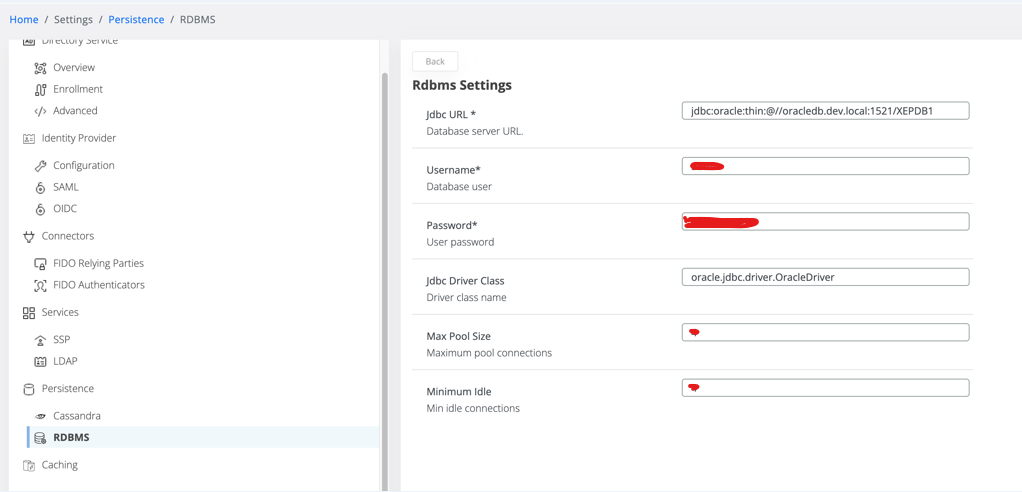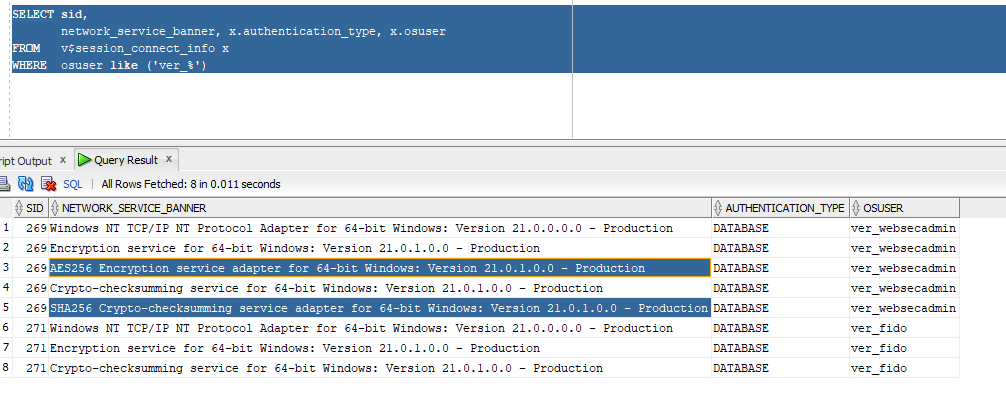Migrate data from Cassandra to Oracle
Encryption:
Data in transit - it is supported Oracle Native Network Encryption
using properties for server:
SQLNET.ENCRYPTION_SERVER = REQUIRED
SQLNET.ENCRYPTION_TYPES_SERVER = (AES256)
using properties for client:
SQLNET.ENCRYPTION_CLIENT = REQUIRED
SQLNET.ENCRYPTION_TYPES_CLIENT = (AES256)
Check at the end of the document, to see if encryption at transit is enabled.
Data at rest can be done by enabling in zookeeper the data protection. The following encryption mechanisms can be enforced:
Using internal veridium protection by enable JCEKS
Using HSM
Here is the needed documentation: https://docs.veridiumid.com/docs/v3.8/configuring-data-protection .
Overall process description:
Prepare oracle database schema by Client team - to be done before the intervention, at any time, regardless of the release - steps 1.a, 1.b, 1.c
create schema
test connection from veridium to oracle (network connection should be opened between webapp servers to oracle)
Actual migration - downtime 1h30 min
stop veridium application - 5 min.
migrate data from Cassandra to Oracle. - around one hour
start veridium application - 5 min
Start testing.
in case that something goes wrong, there will be a rollback procedure - it takes around 15 minutes of downtime.
stop veridium application
commute veridium to connect back to cassandra
start veridium application.
bring back elasticsearch data to the point before the change
Technical steps:
This is the guide to migrate an environment from Cassandra to Oracle.
Create a user veridiumid with the necessary privileges (user will not have DBA privileges). Also it is recommended to have it’s own tablespace.
Create tenant table space (the space’s initial size and max size is to be discussed):
- CODE
CREATE TABLESPACE veridium_ts DATAFILE 'veridium_ts01.dbf' SIZE 1024M AUTOEXTEND ON NEXT 512M MAXSIZE UNLIMITED; ## if UNLIMITED is not allowed, please set 50Gb.
Create user cmd:
- CODE
CREATE USER veridium IDENTIFIED BY <user-pwd> DEFAULT TABLESPACE veridium_ts QUOTA UNLIMITED ON veridium_ts; ALTER USER veridium QUOTA UNLIMITED ON veridium_ts;
Grant privileges:
- CODE
GRANT CREATE SESSION TO veridium; GRANT CREATE TABLE TO veridium; GRANT CREATE VIEW TO veridium; GRANT CREATE SEQUENCE TO veridium; GRANT CREATE PROCEDURE TO VERIDIUM; GRANT CREATE TRIGGER TO VERIDIUM; GRANT CREATE SYNONYM TO VERIDIUM; GRANT CREATE TYPE TO VERIDIUM;
Please discuss with DBA to have a collect statistics job for VERIDIUM on a daily basis. Also DBA should monitor the Tablespace size.
Open Websecadmin and open Settings → Persistence → RDBMS and save the JDBC driver configuration. Jdbc configuration is stored in config.json node in ZK. Example:
CODE"jdbc": { "jdbcUrl": "jdbc:oracle:thin:@//oracledb.dev.local:1521/XEPDB1", "jdbcDriverClass": "oracle.jdbc.driver.OracleDriver", "username": "USERNAME", "password": "PASSWORD", ......... }

To configure encryption, go to advanced settings, open config.json file and go to “jdbc“ config section. There should be a filed named additionalProperties (otherwise add it in jdbc section) and add following additional parameters with proper values (specific for your environment):
"additionalProperties": {
"oracle.net.encryption_client": "REQUIRED",
"oracle.net.encryption_types_client": "(AES256)",
"oracle.net.crypto_checksum_client": "REQUIRED",
"oracle.net.crypto_checksum_types_client": "(SHA256)"
}
Create tables and indexes in Oracle Database by running the following command:
bash /opt/veridiumid/migration/bin/rdbms_ops.sh --schema-updateOn all webapp nodes stop the following services (run the command as root user):
service ver_tomcat stop
service ver_websecadmin stop
service ver_fido stop
service ver_selfservice stopCheck how many rows are going to be exported. Save the report so it can be compared with the imported oracle data.
## run on persistence
bash /opt/veridiumid/migration/bin/rdbms_ops.sh --summary-cassandraExport the data from Cassandra by running the following command:
## run on webapp
bash /opt/veridiumid/migration/bin/rdbms_ops.sh --cassandra-export --dir=<PATH_TO_DIRECTORY>
# For example
# bash /opt/veridiumid/migration/bin/rdbms_ops.sh --cassandra-export --dir=/home/veridiumid/tmp_cassImport the data to Oracle Database by running the following command:
## run on webapp
bash /opt/veridiumid/migration/bin/rdbms_ops.sh --rdbms-import --dir=<PATH_TO_DIRECTORY>
# For example
# bash /opt/veridiumid/migration/bin/rdbms_ops.sh --rdbms-import --dir=/home/veridiumid/tmp_cassAfter importing the data, please collect statistics - this needs to be executed by DBA on oracle.
BEGIN
DBMS_STATS.GATHER_SCHEMA_STATS(
ownname => 'veridium',
estimate_percent => DBMS_STATS.AUTO_SAMPLE_SIZE,
cascade => TRUE,
degree => DBMS_STATS.AUTO_DEGREE
);
END;Check the Cassandra number of entries, generated at step 6 and oracle imported data - this needs to be executed by DBA on oracle.
select table_name, num_rows from all_tables where owner = 'VERIDIUM' order by 1 asc;Configure the new application profile on all webapp nodes by running the following command:
bash /opt/veridiumid/migration/bin/rdbms_ops.sh --change-profile-rdbmsRestart webapp services by running the following command as root user:
service ver_tomcat start
service ver_websecadmin start
service ver_fido start
service ver_selfservice startI is highly recommended to get some AWR reports the second day, to see if there are any problems. Performance tests were executed still it needs to be monitored properly the first week.
Rollback procedure (with data lost - it will be lost what data was saved to oracle; the revert will consider the data before migration)
stop services
service ver_tomcat stop
service ver_websecadmin stop
service ver_fido stop
service ver_selfservice stopchange parameters from rdmbs to cassandra
bash /opt/veridiumid/migration/bin/rdbms_ops.sh --change-profile-cassandraexport data from Oracle DB
## run on webapp
bash /opt/veridiumid/migration/bin/rdbms_ops.sh --rdbms-export --dir=<PATH_TO_DIRECTORY>
# For example
# bash /opt/veridiumid/migration/bin/rdbms_ops.sh --rdbms-export --dir=/home/veridiumid/tmp_rdbmsimport data to Cassandra
## run on webapp
bash /opt/veridiumid/migration/bin/rdbms_ops.sh --cassandra-import --dir=<PATH_TO_DIRECTORY>
# For example
# bash /opt/veridiumid/migration/bin/rdbms_ops.sh --cassandra-import --dir=/home/veridiumid/tmp_rdbmsstart services
service ver_tomcat start
service ver_websecadmin start
service ver_fido start
service ver_selfservice startdelete some elastic indices and migrate data one more time from Cassandra to elastic.
eops -x=DELETE -p=/veridium.accounts-000001
eops -x=DELETE -p=/veridium.profiles-000001
eops -x=DELETE -p=/veridium.fido_devices-000001
eops -x=DELETE -p=/veridium.devices-000001
bash /opt/veridiumid/migration/bin/elk_ops.sh --update-settings
/opt/veridiumid/migration/bin/migrate_to_elk.sh -a
/opt/veridiumid/migration/bin/migrate_to_elk.sh -d
/opt/veridiumid/migration/bin/migrate_to_elk.sh -p
/opt/veridiumid/migration/bin/migrate_to_elk.sh -f
See if encryption is enabled by running the following query on oracle. The connection should have these parameters:
AES256 Encryption service adapter for 64-bit Windows: Version 21.0.1.0.0 - Production
SHA256 Crypto-checksumming service adapter for 64-bit Windows: Version 21.0.1.0.0 - Production
See below one connection that is encrypted and one is not encrypted.

